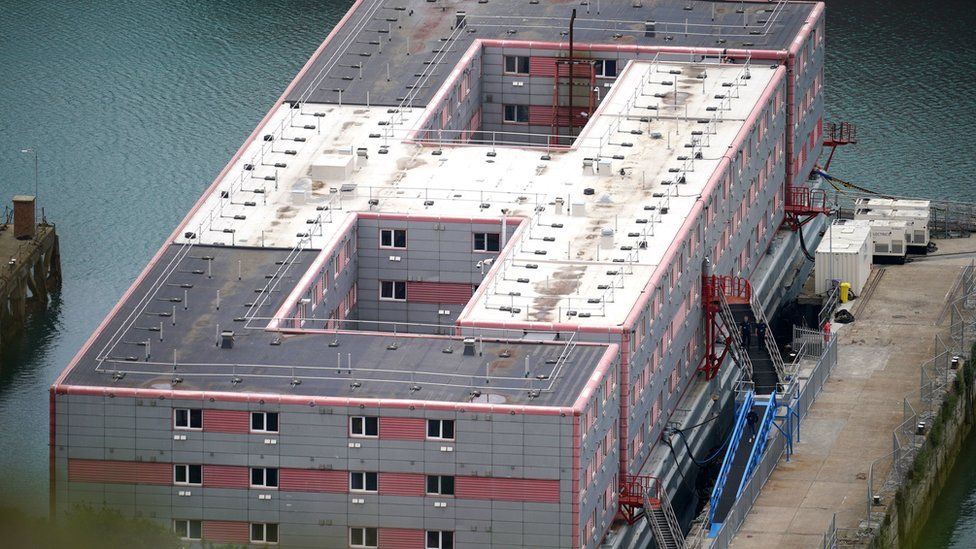
By Thomas Mackintosh
BBC News
Ministers took “instant action” to move 39 asylum seekers from the Bibby Stockholm barge after Legionella bacteria was found last week, the health secretary said.
Steve Barclay was questioned why people were moved in when officials knew tests were being conducted.
He told BBC Radio 4’s Today programme that “no-one has been harmed”.
Home Office ministers say the presence of bacteria was confirmed to them on Thursday, and they then took action.
In an earlier interview with Sky News, Mr Barclay said: “As soon as ministers were notified on Thursday night, there were some concerns with that, they took instant action.”
“My understanding from colleagues in the Home Office is it was notified to Home Office ministers on Thursday and they then took very quick action as a result.”
Legionella bacteria can cause Legionnaires disease, a type of pneumonia, if it is breathed in via tiny droplets of water suspended in the air.
Around 5%-10% of cases are fatal. People with underlying health conditions, the over 50s and smokers are at risk of serious illness.
The barge had been billed as a cheaper alternative to hotels for asylum seekers awaiting the outcome of their claims.
The government eventually plans to house up to 500 men aged 18-65 on the vessel moored in Portland Port while they await the outcome of asylum applications.
Mr Barclay added “progress is being made” on his government’s migrant policy. “We recognise there is more to do. The barge is one aspect of that. We need to go further.”
Dorset Council said it informed Home Office contractors about preliminary test results last Monday.
In a statement, the council said: “To be clear, it was not Dorset Council’s responsibility to inform the Home Office – that responsibility sat with CTM and Landry and King, the companies contracted by the Home Office to operate the barge.”
The full timeline remains unclear and the council has not yet said whether it told contractors before or after the transfer of migrants on to the barge.
A senior Home Office source told the BBC that the department did not receive a formal notification of the presence of Legionella until Wednesday evening.
The source said the person notified on Tuesday was a “junior” member of staff who happened to be on a call with contractors.
They also said that the department was “led” by the UK Health Security Agency, which did not recommend people were moved off the barge until Thursday night.
Prof Dame Jenny Harries, the chief executive of the agency, said that legionella bacteria detected in routine tests would not “necessarily indicate there is a systemic problem”.
“Just finding legionella does not necessarily mean there is a significant risk to human health,” she told Today.
“It is primarily the responsibility of the operator or the manager of the premises or with the services to ensure that is fully managed before there are people using the services.”
The government has been criticised over its handling of the Bibby Stockholm, including from within its own ranks.
David Davis, a Conservative MP, said that the “startling incompetence” of the Home Office had been laid bare, while former party chairman Sir Jake Berry described the removals as “farcical”.
However, Wales Secretary David TC Davis on Sunday defended the government’s handling of the situation, telling Times Radio that it “actually demonstrates how we’re putting the safety of people first”.
Without an engine and now virtually empty, the Bibby Stockholm has come to symbolise the UK’s response to its asylum crisis.
A functional deterrent to those who might abuse our generosity, according to ministers. Dead in the water, critics say – a cruel dereliction of Britain’s responsibilities to those fleeing conflict and persecution
The arguments about who and when people knew the vessel’s water supply was contaminated with dangerous bacteria will rumble on, but the unfortunate barge is a headline-grabbing distraction from the real problems of an asylum system even the government accepts is broken.
The barge comes at a financial cost too, of course, and a number of senior Conservative MPs are now publicly fuming at the political price the party is paying.
It will be pointed out the number of migrants who crossed the Channel on Saturday alone would more than fill a barge, but that would miss what lies at the heart of this problem.
It’s true, the number of asylum applications has increased in the last couple of years. But, the backlog of people waiting for the Home Office to make a decision on asylum claims has gone up three times as quickly over the same period.
The backlog was rising before small boats became an issue. Despite a big increase in caseworkers, it is still at almost record levels.
The prime minister’s promise to end the asylum crisis relies on deterring migrants from coming. But change so far appears as sluggish as an engineless barge in Portland Harbour.








